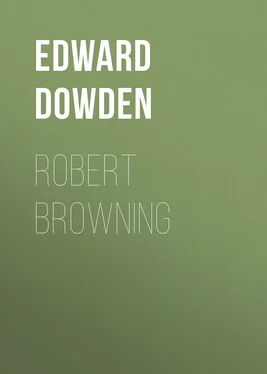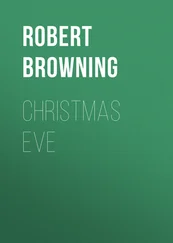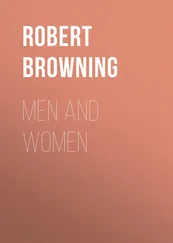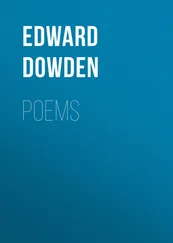Edward Dowden - Robert Browning
Здесь есть возможность читать онлайн «Edward Dowden - Robert Browning» — ознакомительный отрывок электронной книги совершенно бесплатно, а после прочтения отрывка купить полную версию. В некоторых случаях можно слушать аудио, скачать через торрент в формате fb2 и присутствует краткое содержание. Жанр: Биографии и Мемуары, Поэзия, foreign_antique, foreign_prose, foreign_poetry, на английском языке. Описание произведения, (предисловие) а так же отзывы посетителей доступны на портале библиотеки ЛибКат.
- Название:Robert Browning
- Автор:
- Жанр:
- Год:неизвестен
- ISBN:нет данных
- Рейтинг книги:5 / 5. Голосов: 1
-
Избранное:Добавить в избранное
- Отзывы:
-
Ваша оценка:
- 100
- 1
- 2
- 3
- 4
- 5
Robert Browning: краткое содержание, описание и аннотация
Предлагаем к чтению аннотацию, описание, краткое содержание или предисловие (зависит от того, что написал сам автор книги «Robert Browning»). Если вы не нашли необходимую информацию о книге — напишите в комментариях, мы постараемся отыскать её.
Robert Browning — читать онлайн ознакомительный отрывок
Ниже представлен текст книги, разбитый по страницам. Система сохранения места последней прочитанной страницы, позволяет с удобством читать онлайн бесплатно книгу «Robert Browning», без необходимости каждый раз заново искать на чём Вы остановились. Поставьте закладку, и сможете в любой момент перейти на страницу, на которой закончили чтение.
Интервал:
Закладка:
For the humours of superficial situations and passing incidents Miss Barrett had a lively sense, and she found some relief in playing with them; but with a nature essentially truthful like hers the necessity of concealment was a cause of distress. The position was no less painful to Browning, and in the end it became intolerable. Yet while there were obstructions and winding ways in the shallows, in the depths were flawless truth and inviolable love. What sentimental persons fancy and grow effusive over was here the simplest and yet always a miraculous reality—"He of the heavens and earth brought us together so wonderfully, holding two souls in his hand." 37 37 E.B.B. to R.B., March 30, 1846.
In the most illuminating words of each correspondent no merely private, or peculiar feeling is expressed; it is the common wave of human passion, the common love of man and woman, that here leaps from the depths to the height, and over which the iris of beauty ever and anon appears with—it is true—an unusual intensity. And so in reading the letters we have no sense of prying into secrets; there are no secrets to be discovered; what is most intimate is most common; only here what is most common rises up to its highest point of attainment. "I never thought of being happy through you or by you or in you even, your good was all my idea of good, and is " "Let me be too near to be seen.... Once I used to be more uneasy, and to think that I ought to make you see me. But Love is better than sight." "I love your love too much. And that is the worst fault, my beloved, I can ever find in my love of you ." These are sentences that tell of what can be no private possession, being as liberal and free as our light and air. And if the shadow of a cloud appears—appears and passes away—it is a shadow that has floated over many other hearts beside that of the writer: "How dreadfully natural it would be to me, seem to me, if you did leave off loving me! How it would be like the sun's setting … and no more wonder. Only, more darkness." The old exchange of tokens, the old symbolisms—a lock of hair, a ring, a picture, a child's penholder—are good enough for these lovers, as they had been for others before them. What is diffused through many of the letters is gathered up and is delivered from the alloy of superficial circumstance in the "Sonnets from the Portuguese." in reading which we are in the presence of womanhood—womanhood delivered from death by love and from darkness by; light—as much as in that of an individual woman. And the disclosure in poems and in letters being without reserve affects us as no disclosure, but simply as an adequate expression of the truth universal.
One obstacle to the prospective marriage was steadily diminishing in magnitude; Miss Barrett, with a new joy in life, new hopes, new interests, gained in health and strength from month to month. The winter of 1845-46 was unusually mild. In January one day she walked—walked, and was not carried—downstairs to the drawing-room. Spring came early that year; in the first week of February lilacs and hawthorn were in bud, elders in leaf, thrushes and white-throats in full song. In April Miss Barrett gave pledges of her confidence in the future by buying a bonnet; a little like a Quaker's, it seemed to her, but the learned pronounced it fashionable. Early in May, that bonnet, with its owner and Arabel and Flush, appeared in Regent's Park, while sunshine was filtering through the leaves. The invalid left her carriage, set foot upon the green grass, reached up and plucked a little laburnum blossom ("for reasons"), saw the "strange people moving about like phantoms of life," and felt that she alone and the idea of one who was absent were real—"and Flush," she adds with a touch of remorse, "and Flush a little too." Many drives and walks followed; at the end of May she feloniously gathered some pansies, the flowers of Paracelsus, and this notwithstanding the protest of Arabel, in the Botanical Gardens, and felt the unspeakable beauty of the common grass. Later in the year wild roses were found at Hampstead; and on a memorable day the invalid—almost perfect in health—was guided by kind and learned Mrs Jameson through the pictures and statues of the poet Rogers's collection. On yet another occasion it was Mr Kenyon who drove her to see the strange new sight of the Great Western train coming in; the spectators procured chairs, but the rush of people and the earth-thunder of the engine almost overcame Miss Barrett's nerves, which on a later trial shrank also from the more harmonious thunder of the organ of the Abbey. Sundays came when she enjoyed the privilege of sitting if not in a pew at least in the secluded vestry of a Chapel, and joining unseen in those simple forms of prayer and praise which she valued most. Altogether something like a miracle in the healing of the sick had been effected.
Money difficulty there was none. Browning, it is true, was not in a position to undertake the expenses of even such a simple household economy as they both desired. He was prepared to seek for any honourable service—diplomatic or other—if that were necessary. But Miss Barrett was resolved against task-work which might divert him from his proper vocation as a poet. And, thanks to the affection of an uncle, she had means—some £400 a year, capable of considerable increase by re-investment of the principal—which were enough for two persons who could be content with plain living in Italy. Browning still urged that he should be the bread-winner; he implored that her money should be made over to her own family, so that no prejudice against his action could be founded on any mercenary feeling; but she remained firm, and would consent only to its transference to her two sisters in the event of his death. And so the matter rested and was dismissed from the thoughts of both the friends.
Having the great patience of love, Browning would not put the least pressure upon Miss Barrett as to the date of their marriage; if waiting long was for her good, then he would wait. But matters seemed tending towards the desired end. In January he begged her to "begin thinking"; before that month had closed it was agreed that they should look forward to the late summer or early autumn as the time of their departure to Italy. Not until March would Miss Barrett permit Browning to fetter his free will by any engagement; then, to satisfy his urgent desire, she declared that she was willing to chain him, rivet him—"Do you feel how the little fine chain twists round and round you? do you hear the stroke of the riveting?" But the links were of a kind to be loosed if need be at a moment's notice. June came, and with it a proposal from a well-intentioned friend, Miss Bayley, to accompany her to Italy, if, by and by, such a change of abode seemed likely to benefit her health. Miss Barrett was prepared to accept the offer if it seemed right to Browning, or was ready, if he thought it expedient, to wait for another year. His voice was given, with such decision as was possible, in favour of their adhering to the plan formed for the end of summer; they both felt the present position hazardous and tormenting; to wear the mask for another year would suffocate them; they were "standing on hot scythes."
Accordingly during the summer weeks there is much poring over guide-books to Italy; much weighing of the merits of this place of residence and of that. Shall it be Sorrento? Shall it be La Cava? or Pisa? or Ravenna? or, for the matter of that, would not Seven Dials be as happy a choice as any, if only they could live and work side by side? There is much balancing of the comparative ease and the comparative cost of routes, the final decision being in favour of reaching Italy by way of France. And as the time draws nearer there is much searching of time-tables, in the art of mastering which Robert Browning seems hardly to have been an expert. May Mr Kenyon be told? Or is it not kinder and wiser to spare him the responsibility of knowing? Mrs Jameson, who had made a friendly proposal similar to that of Miss Bayley,—may she be half-told? Or shall she be invited to join the travellers on their way? What books shall be brought? What baggage? And how may a box and a carpet bag be conveyed out of 50 Wimpole Street with least observation?
Читать дальшеИнтервал:
Закладка:
Похожие книги на «Robert Browning»
Представляем Вашему вниманию похожие книги на «Robert Browning» списком для выбора. Мы отобрали схожую по названию и смыслу литературу в надежде предоставить читателям больше вариантов отыскать новые, интересные, ещё непрочитанные произведения.
Обсуждение, отзывы о книге «Robert Browning» и просто собственные мнения читателей. Оставьте ваши комментарии, напишите, что Вы думаете о произведении, его смысле или главных героях. Укажите что конкретно понравилось, а что нет, и почему Вы так считаете.












